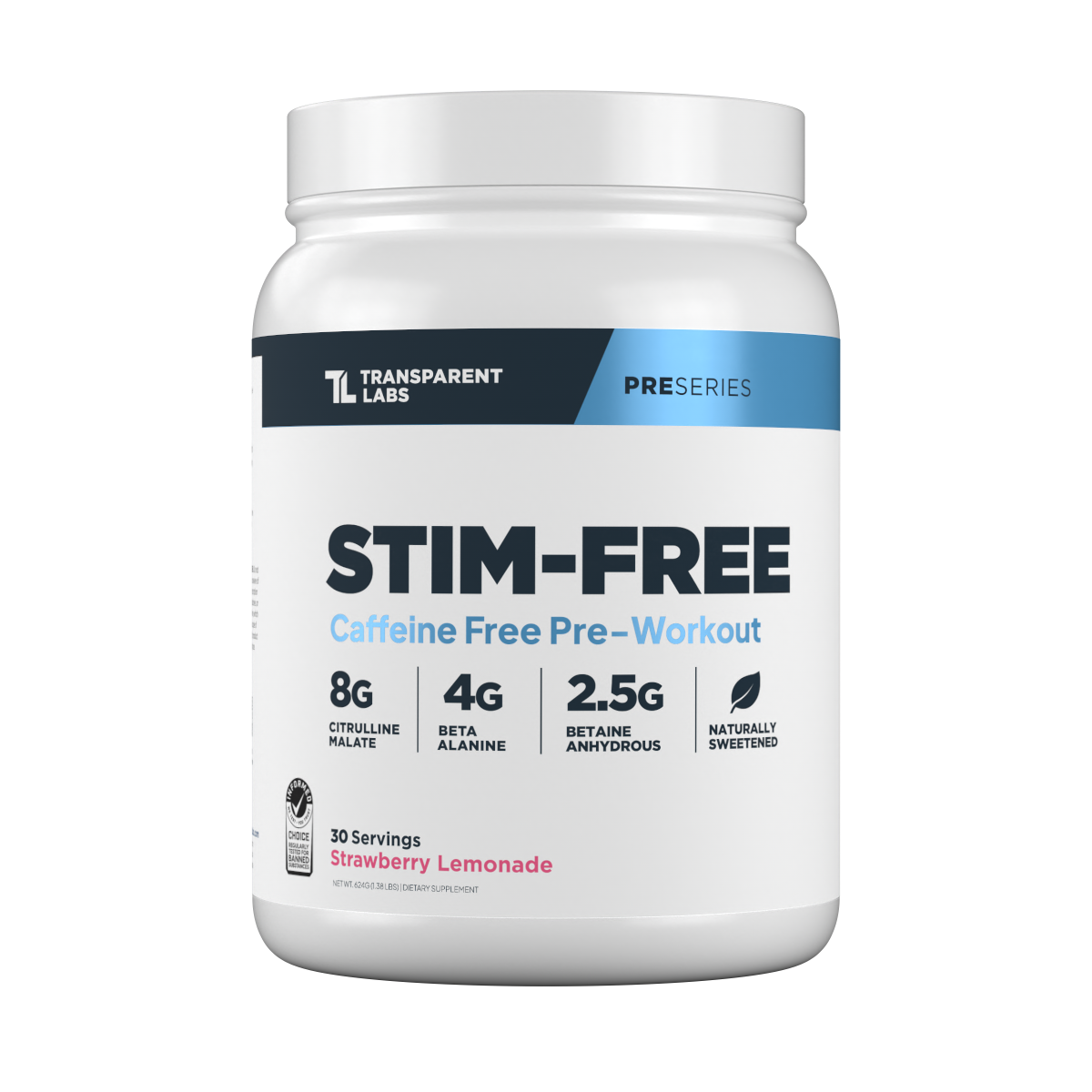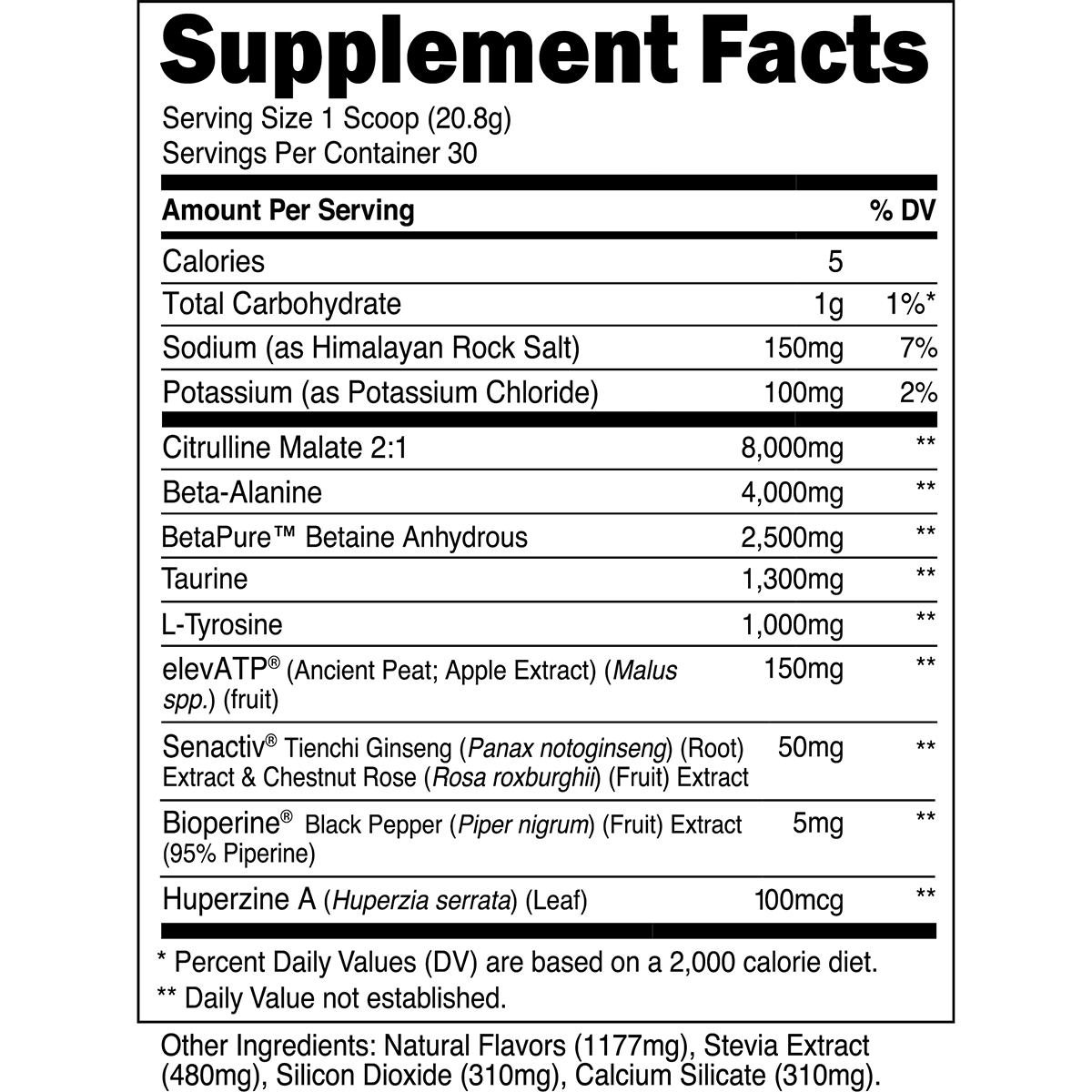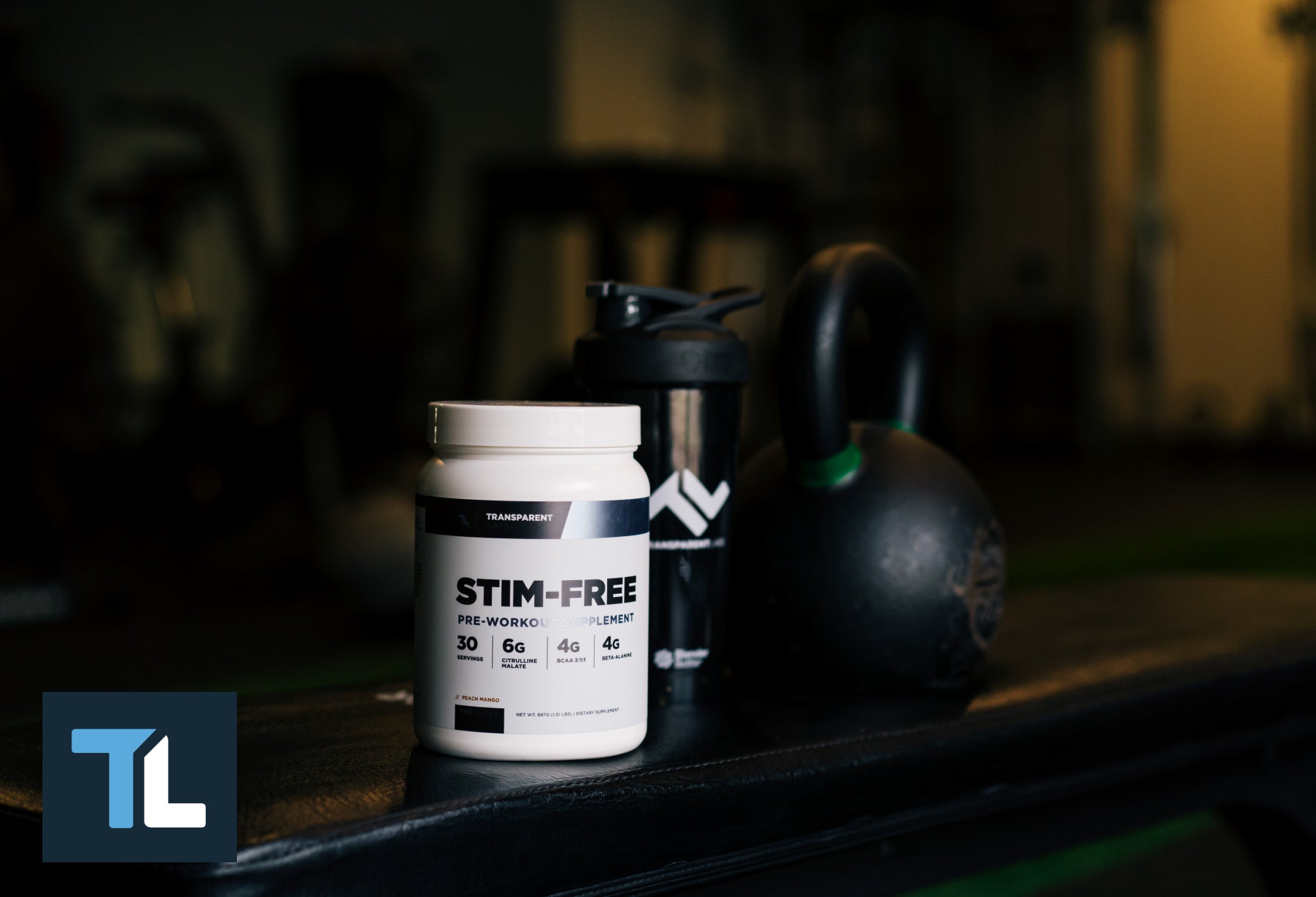Pre-workout supplements, or pre-workouts, are designed to be taken before exercise to give you an energy boost, help you stay focused, and improve your performance during intense workouts or exercise. They usually contain ingredients like caffeine, creatine, beta-alanine, and amino acids.
Since many of these supplements contain stimulants, you may wonder whether pre-workout heart problems are something to worry about. This concern is especially valid if you have a heart condition or are sensitive to caffeine.
We asked Dr. Kezia Joy, a Registered Dietitian at Welzo and specialist in metabolic health and dietary supplementation, about pre-workouts. Here’s what she shared with Transparent Labs:
“Pre-workout supplements may temporarily raise resting heart rate and blood pressure, even in healthy people with no known heart issues. These effects are short-term and usually not a problem for most healthy users. But how someone reacts can really vary depending on factors like age, body weight, caffeine tolerance, and whether they've eaten around the time they took the supplement or had other sources of stimulation.”
In this article, we’ll look at what research says about how pre-workout affects the heart. We’ll also talk about the possible risks and share some tips on how to use it safely.
What’s in a Typical Pre-Workout Supplement?
Whether you’re cutting or bulking, there’s a pre-workout made to match your goal. Most pre-workout supplements are a mix of ingredients designed to work together to reduce fatigue, improve endurance, and increase energy levels. Here's a quick look at some of the most common ones:
-
Caffeine: One of the main ingredients. It helps increase alertness and energy. Most pre-workouts have up to 300 mg caffeine per serving, which is like 2–3 cups of coffee (1).
-
Beta-alanine: Known as a pre-workout ingredient that causes tingling. It may help reduce muscle fatigue and improve endurance during high-intensity workouts. Research suggests that taking beta-alanine for at least four weeks can help improve exercise performance, especially during short, intense workouts (2).
-
L-citrulline: Helps increase blood flow and oxygen to your muscles, which can improve performance and reduce soreness.
-
Creatine: Creatine in pre-workouts is often added to support strength, muscle growth, and overall exercise performance.
-
Nitrates: These help with blood flow and muscle efficiency, often leading to better endurance.
-
Stimulant blends: Some pre-workouts mix different stimulants to boost energy, but these can be intense and may raise your heart rate or blood pressure.
Transparent Labs offers two standout pre-workouts designed for different fitness goals. If your goal is to stay lean while still having good energy and focus, Transparent Labs Lean Pre-Workout is made just for that. It’s packed with ingredients that support fat loss, boost endurance, and help you stay sharp during workouts, without any artificial colors, sweeteners, or flavors.
But if you’re in a muscle-building phase and want something stronger, Bulk Black Pre-workout is the way to go. It’s a high-stim formula with over 17 grams of active ingredients per scoop, including nitric oxide boosters, nootropics, and natural testosterone support. Basically, it’s for days when you want to lift heavy and go all in.
How Pre-Workout Affects the Heart
We asked Matt Dustin, a Certified Precision Nutrition Coach at Garage Gym Reviews, about how pre-workout affects the heart. He shared, “There’s not a ton of long-term research, but regular overuse, especially with high doses of stimulants, could stress the heart and blood vessels over time. Habitual use can also mess with your resting heart rate, blood pressure, and even sleep, which all matter for heart health."
Here’s a brief review of the short-term and long-term effects of pre-workouts on the heart.
Short-term effects
-
Elevated heart rate and blood pressure: Many pre-workouts contain caffeine and other stimulants that can temporarily raise your heart rate and blood pressure, even if you're healthy (3).
-
Vasodilation: Some ingredients in pre-workouts (like L-citrulline or nitrates) help your blood vessels relax and open up (4). This allows more blood to flow to your muscles during exercise, which improves oxygen and nutrient delivery. Vasodilation is what gives you the "pumped" feeling; it's why your muscles feel fuller and more active.
Long-term concerns
- Habitual overstimulation: Using high-stim pre-workouts too often can lead to your body getting overstimulated. Over time, this may put extra stress on your heart and nervous system, making it harder for your body to relax and recover. If you're not cycling off or giving your system a break, it might increase the risk of high blood pressure or irregular heartbeat (5).
-
Anxiety and heart palpitations: Some people may feel jittery, anxious, or experience heart palpitations, especially if they’re sensitive to caffeine or already dealing with heart issues (6).
“Pre-workout powders may contain anywhere from 150 mg to 300 mg of caffeine per serving. That’s quite a lot, especially considering the recommended daily limit for healthy adults is around 400 mg, according to several health authorities,” says Joy.
She adds, “If someone is also consuming coffee, tea, or energy drinks throughout the day, they could easily exceed this limit without realizing it, which may lead to heart palpitations.”

What the Science Says
Here's a closer look at current research on caffeine, multi-ingredient pre-workouts, and how these affect different individuals.
Caffeine and Cardiovascular Health
While moderate caffeine intake (up to 400 mg/day) is generally considered safe for healthy adults and may even offer some heart-protective benefits, such as lowering the risk of stroke or cardiovascular disease, high doses can temporarily raise blood pressure and heart rate (6,7).
According to nutrition coach Dustin, caffeine is a major concern for heart health, especially when combined with other stimulants like yohimbine or synephrine. In high doses, these ingredients can overstimulate the heart. For people with underlying conditions or those who exceed the recommended dosage, this could increase the risk of a cardiac event.
“While it’s unlikely to cause a heart attack out of nowhere in most people, it’s not without risks,” notes Dustin.
Pre-Workout Formulas vs Isolated Stimulants
Multi-ingredient pre-workout supplements offer a blend of ingredients, while isolated stimulants like caffeine provide a single effect (8). While pre-workouts can improve perceived energy and focus, research on their specific effects on performance and safety is mixed. Isolated stimulants like caffeine are known to improve endurance and can be safer, but their effects can be more predictable.
“It all comes down to individual sensitivity, your goals, and your general state of health,” notes Joy. Talking to a doctor or registered dietitian may also help you decide the safest and most effective option for your individual needs.
Pre-Workout's Impact on Healthy Adults vs Those with Heart Conditions
In healthy adults, most pre-workout ingredients (including caffeine) are safe in moderate doses and may help with performance. A 2020 randomized, double-blind crossover study found that a pre-workout supplement significantly boosted strength and power in twenty-three trained men. Participants showed greater leg strength, lifted more weight, and produced higher cycling power compared to when they took a placebo (9).
“Pre-workout is not necessarily dangerous if you’re healthy, but it’s something to watch if you already have high blood pressure or are sensitive to stimulants,” notes Dustin.
Caffeine and other stimulants may worsen blood pressure, trigger arrhythmias, or increase cardiovascular stress, especially if you exceed recommended doses or combine multiple stimulants unknowingly (3).
Who Might Be at Risk?
While pre-workout supplements can enhance performance, they’re not suitable for everyone. You may be more sensitive to stimulants like caffeine if you experience any of the following:
-
High blood pressure (hypertension)
-
Irregular heart rhythms (arrhythmias or tachycardia)
-
Anxiety disorders
People with a family history of heart disease should also be cautious, as their risk of heart issues may already be higher.
Dry scooping pre-workout (taking a full dose of powder without water) has gained popularity among young adults doing high-intensity exercise, but it comes with serious health risks. Case reports and observational studies in the medical literature have linked this practice to adverse effects like breathing problems, cardiac arrest, and a higher risk of complications (10,11).
Pregnant or breastfeeding women are generally advised to keep their caffeine intake below 200 mg per day, which means many pre-workout supplements may be unsuitable. Caffeine can also interact with some medications and other substances in herbal supplements, so it’s important to speak with your doctor before beginning any new supplement.
Safer Pre-Workout Alternatives
For those looking for safer pre-workout options, there are several alternatives to consider. Transparent Labs Stim-Free Pre-Workout offers a safer alternative of clinically effective, stimulant-free ingredients such as citrulline malate, beta-alanine, betaine, taurine, and nootropics to support top performance without causing jitters or interfering with sleep.
Or, if you prefer a simple stimulant, Transparent Labs PurCaf Organic Caffeine Capsules deliver a natural energy and focus boost. Made from organic green coffee beans, each capsule provides 200 mg of pure caffeine, the equivalent of about two cups of black coffee, helping improve endurance and mental clarity without added fillers.
“Natural stuff can be effective, and natural stuff is a good start for lots of us. Having a light meal or snack containing some complex carbohydrates two hours before a workout may also provide energy for exercise. For example, oatmeal with fruit, whole grain toast with peanut butter, or a banana with a small amount of yogurt,” notes dietitian Joy.
She also adds, “Those looking for a lighter energy booster may find it in the form of smaller doses of caffeine, such as are found in natural sources like green tea or black coffee, which they may be more sensitive to. Some people even branch out to beetroot juice or adaptogenic herbs, which are being researched for their ability to help support energy and endurance more subtly.”

How to Use Pre-Workout Responsibly
Using pre-workout supplements safely starts with understanding what’s in them. Always check the label for serving sizes and total caffeine content, as some formulas can contain as much as 300 mg per serving. When it comes to supplements, it's important to choose products that are third-party tested and free from artificial additives.
Avoid combining pre-workout with other sources of caffeine, like energy drinks or coffee, as this can increase the risk of side effects such as jitters, palpitations, or anxiety. Never exceed the recommended dosage, even if you feel the product isn’t “working fast enough.”
More isn’t always better, and overdosing can be dangerous. If you have any heart-related issues or underlying health concerns, talk to your doctor before adding a pre-workout to your routine.
“Proper hydration is also essential when taking pre-workout supplements, as it helps the body effectively digest and absorb the various ingredients. Make sure to drink enough water before, during, and after workouts to maximize the benefits and ensure safer use of the supplements,” adds Joy.
Final Verdict: Is Pre-Workout Bad for Your Heart?
While many people take pre-workout supplements to improve athletic performance and workout performance, it's important to understand the potential risks. Some dietary supplements, especially those with too much caffeine, have been linked to pre-workout heart problems such as chest pain or an irregular heartbeat. These adverse events related to taking a pre-workout may occur when people use higher doses than recommended or have pre-existing heart conditions.
Since supplements are not regulated by the Food and Drug Administration (FDA), it's important to choose products with a safe dose of ingredients and those that are third-party tested. Although there are health benefits to properly using supplements, excessive use may increase your cardiovascular risk. While pre-workouts can be an incredible addition to your workout routine when used safely, it's always worth picking high-quality supplements and speaking to your doctor if you have any concerns.
FAQs
Can pre-workout cause heart attacks?
In healthy people, pre-workout supplements are unlikely to cause a heart attack when used as directed. However, misuse such as dry scooping, excessive dosing, or combining with other stimulants can increase the risk of heart attacks, especially in people with underlying heart conditions or caffeine sensitivity.
What’s a safe caffeine limit per day?
Most health authorities recommend a daily caffeine limit of up to 400 mg (equivalent to four cups of coffee) for healthy adults. This includes all sources, coffee, tea, energy drinks, and supplements. Always check your pre-workout label to make sure you're not exceeding this limit.
Is pre-workout safe with high blood pressure?
Stimulants like caffeine can temporarily raise your blood pressure and heart rate. If you have high blood pressure or heart-related concerns, it’s best to consult your doctor before using any pre-workout supplement, especially those with a high stimulant content.
Can you build a tolerance to pre-workout?
Yes. Over time, your body can become less responsive to the effects of caffeine and other stimulants. For some people, this might lead to gradually increasing the dose beyond the recommended limit, which can be risky. To avoid tolerance, consider cycling off pre-workout periodically or choosing low-stimulant or stim-free options.











